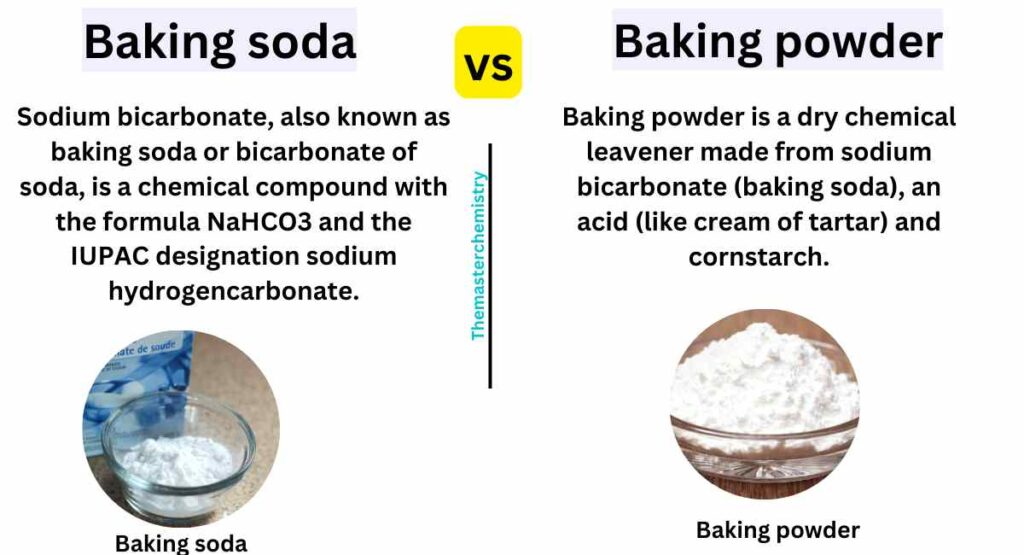LEARNING OBJECTIVES
Table of Contents
In this article, the author has explained 7 Differences Between baking soda and baking powder
The main difference between baking soda and baking powder is that baking soda requires an acidic ingredient to activate, while baking powder contains both acid and base components for activation.

In this blog post, we will go in-depth about the difference between these two ingredients so that you can use them to your advantage while cooking!
Related articles
7 Differences Between Vaporization And Evaporation
A Clarification of Difference between Orbit and Orbitals
What is baking soda?
Baking Soda, also known as sodium bicarbonate, has an alkaline pH of about eight! A high alkaline content means that it can react with acidic ingredients in recipes to create air bubbles that will expand during cooking. This reaction is what causes baked goods to rise!
What is baking powder?
Baking Powder differs from baking soda because it already contains its own acid, which means fewer acids need to be added to the recipe itself. The most common type of baking powder is made up of baking soda, cornstarch, and cream of tartar.
What are the differences between Baking Soda and Baking Powder?
- Baking powder does not always need to be paired with an acidic ingredient in order for it to react because the acid itself has already been added! This means that you do not have to worry about whether or not your recipe contains acidic ingredients.
This also means that you can use baking powder in recipes that do not require rising, such as cookies! Baking soda does need to be paired with an acid ingredient because its alkaline pH of it will prevent it from reacting on its own. This means that you must be very mindful of what other ingredients are added to your recipe because baking soda cannot be used in recipes that do not contain acidic components. - The second difference between Baking Soda and Baking Powder is that Baking Soda is pure sodium.
- The third main difference between Baking Soda and Baking Powder is that baking soda is a base while Baking powder may be a base or acid.
- The fourth difference between Baking Soda and Baking Powder is that Baking Soda is less potent than baking powder. This means that you must use more of it to get the same leavening effect as other products like baking powder, which has a longer shelf life and can be stored for up to two years before opening without losing effectiveness.
- The fifth difference between Baking Soda and Baking Powder is that Baking soda also reacts with acid ingredients in recipes much faster than baking powder.
- The sixth difference between Baking Soda and Baking Powder is that the reaction time of sodium bicarbonate with acid ingredients in recipes varies among different sources, but it can happen within one minute or take up to 15 minutes depending on the recipe ingredients used. For example, by adding sour cream to a batter containing baking soda, the reaction time will be very quick.
- The seventh difference between Baking Soda and Baking Powder is that baking soda reacts with acid ingredients immediately while baking powder takes longer to react. For example, adding vinegar or lemon juice before using a batter containing both baking soda and flour can cause an immediate chemical reaction which causes bubbles of carbon dioxide to be released, which is what makes baked good.
Differences Between Baking Soda And Baking Powder
Here is a table showing Difference Between Baking Soda And Baking Powder:
| Characteristic | Baking Soda | Baking Powder |
|---|---|---|
| Composition | Pure sodium bicarbonate | Sodium bicarbonate + acid (cream of tartar) + starch |
| Activation | Requires an acid to activate | Contains both acid and base components for activation |
| Leavening Power | High | Moderate to high |
| Single-Acting or Double-Acting | Single-acting | Single-acting or double-acting (depending on type) |
| Usage | Best for recipes with acidic ingredients | Versatile, suitable for various recipes |
| Storage | Long shelf life, doesn’t degrade easily | Limited shelf life, can lose potency over time |
| Substitution | 3 times the amount of baking powder | 1/4 teaspoon baking soda + 1/2 teaspoon cream of tartar |
| Reactivity | Requires an acid ingredient for reaction | Acidic ingredient not always required for reaction |
| Potency | Less potent than baking powder | More potent than baking soda |
| Composition Variability | Pure sodium | Can contain base or acid components |
| Reaction Time | Reacts quickly with acid ingredients | Takes longer to react with acid ingredients |
| Immediate Reaction | Immediate reaction with acid ingredients | Takes longer to react with acid ingredients |